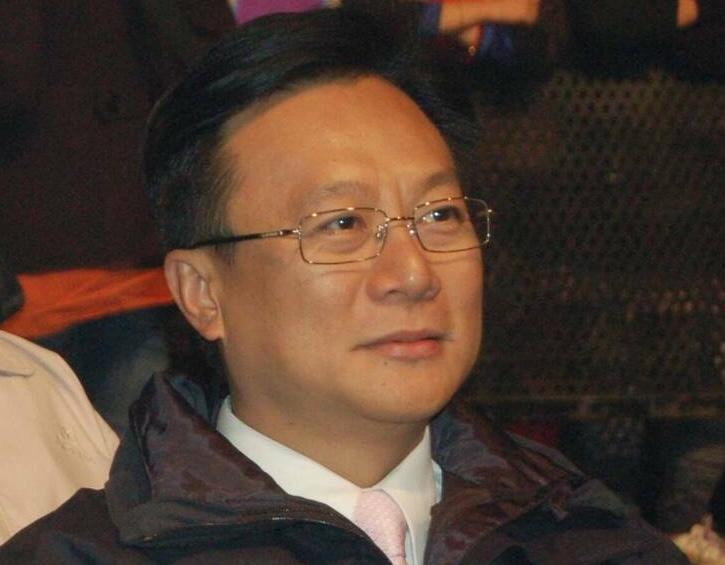Former Changhua County commissioner Cho Po-yuan (卓伯源) today announced his candidacy for chairmanship of the Chinese Nationalist Party (KMT).
If elected, Cho vowed to focus on the role full-time, forego running for president to act as kingmaker and “win back” the party and the Republic of China.
If there are other party members polling higher than himself, Cho said he would be willing to support their candidacy if they are willing to take on the responsibility of leading the KMT.

Photo: Taipei Times
The party is set to hold an election for new leadership this year, but has not yet set a timeline.
KMT Chairman Eric Chu (朱立倫) has not yet stated whether he intended to run for re-election.
In a news conference today, Cho compared Taiwan under the Democratic Progressive Party (DPP) to a “frog slowly boiling in water,” highlighting issues around people’s livelihoods, the economy, peace and sustainability.
He called on the DPP to stop the recall movement to allow the government to function normally, to prevent industrial outflows to avoid layoffs, to no longer advocate for Taiwanese independence and to abandon its position against nuclear energy.
The KMT should also conduct an internal review to find out why it can win at the local level, but lose the presidential election, he added.
Cho said he is participating in the KMT chair election to return Taiwan to a middle ground by acting as a check against the DPP, adding that all parts of society should join the effort.
Asked if he had discussed the matter with Taichung Mayor Lu Shiow-yen (盧秀燕), as media earlier reported she also intends to run in the election, Cho said that he had sent a message to Lu prior to the news conference.
Lu is currently focused on municipal affairs and has not expressed an intent to run in the election, Cho said, adding that the KMT would rally behind whichever candidate is most suited for the role and can bring victory in 2028.
KMT Culture and Communications Committee head Lin Kuan-yu (林寬裕) welcomed Cho’s candidacy, saying it has always been the party’s position to welcome anyone willing to contribute.

Taiwanese can file complaints with the Tourism Administration to report travel agencies if their activities caused termination of a person’s citizenship, Mainland Affairs Council Minister Chiu Chui-cheng (邱垂正) said yesterday, after a podcaster highlighted a case in which a person’s citizenship was canceled for receiving a single-use Chinese passport to enter Russia. The council is aware of incidents in which people who signed up through Chinese travel agencies for tours of Russia were told they could obtain Russian visas and fast-track border clearance, Chiu told reporters on the sidelines of an event in Taipei. However, the travel agencies actually applied

New measures aimed at making Taiwan more attractive to foreign professionals came into effect this month, the National Development Council said yesterday. Among the changes, international students at Taiwanese universities would be able to work in Taiwan without a work permit in the two years after they graduate, explainer materials provided by the council said. In addition, foreign nationals who graduated from one of the world’s top 200 universities within the past five years can also apply for a two-year open work permit. Previously, those graduates would have needed to apply for a work permit using point-based criteria or have a Taiwanese company

The Shilin District Prosecutors’ Office yesterday indicted two Taiwanese and issued a wanted notice for Pete Liu (劉作虎), founder of Shenzhen-based smartphone manufacturer OnePlus Technology Co (萬普拉斯科技), for allegedly contravening the Act Governing Relations Between the People of the Taiwan Area and the Mainland Area (臺灣地區與大陸地區人民關係條例) by poaching 70 engineers in Taiwan. Liu allegedly traveled to Taiwan at the end of 2014 and met with a Taiwanese man surnamed Lin (林) to discuss establishing a mobile software research and development (R&D) team in Taiwan, prosecutors said. Without approval from the government, Lin, following Liu’s instructions, recruited more than 70 software

Chinese spouse and influencer Guan Guan’s (關關) residency permit has been revoked for repeatedly posting pro-China videos that threaten national security, the National Immigration Agency confirmed today. Guan Guan has said many controversial statements in her videos posted to Douyin (抖音), including “the red flag will soon be painted all over Taiwan” and “Taiwan is an inseparable part of China,” and expressing hope for expedited reunification. The agency last year received multiple reports alleging that Guan Guan had advocated for armed reunification. After verifying the reports, the agency last month issued a notice requiring her to appear and explain her actions. Guan